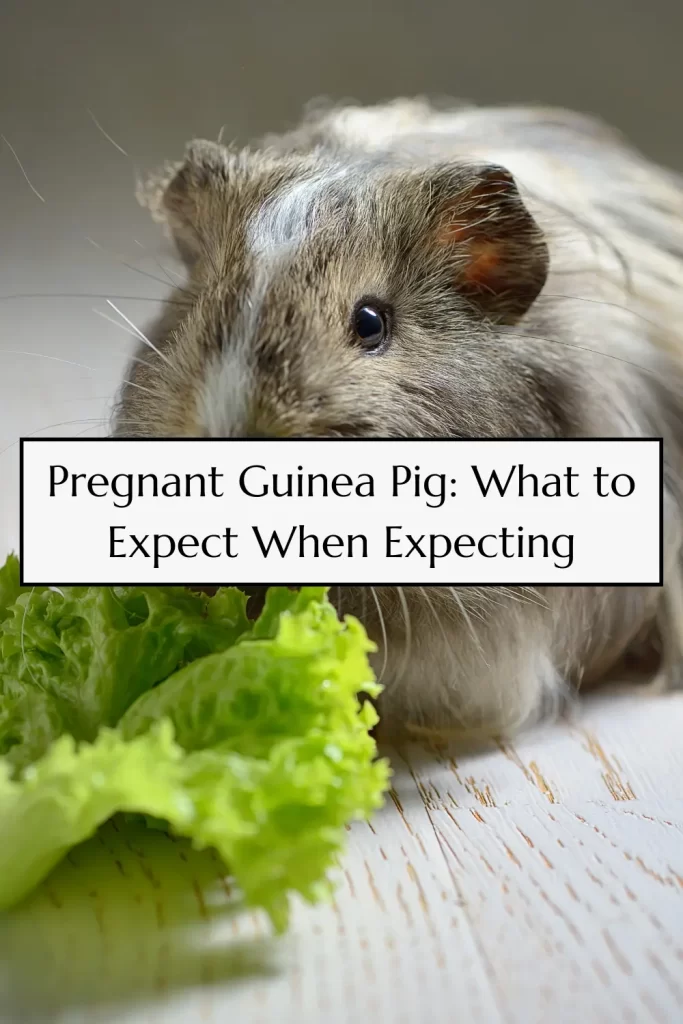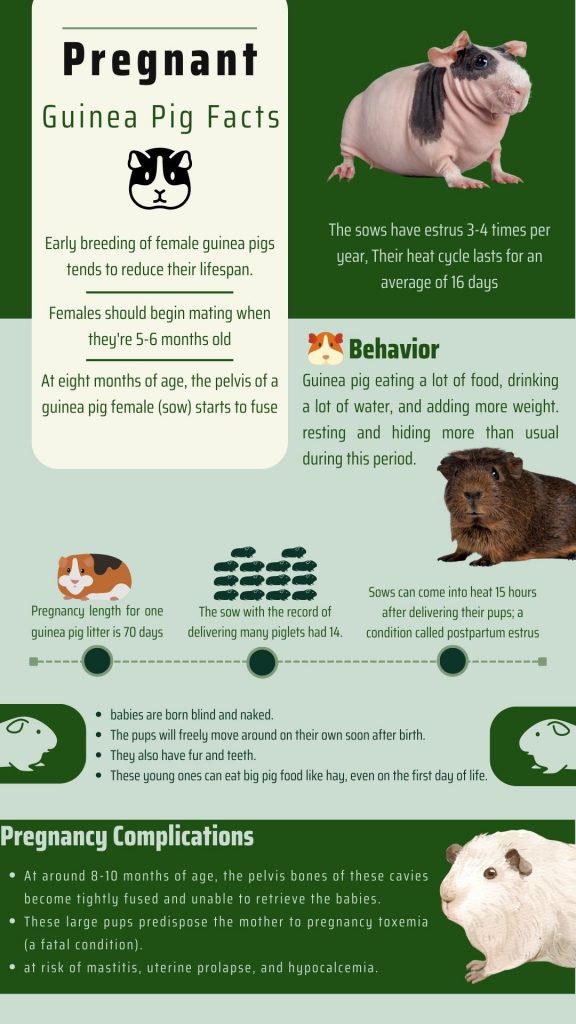
Nourishing Life: A Comprehensive Guide to Guinea Pig Food for Pregnant Sows
Pregnancy is a delicate and demanding period for any animal, and guinea pigs are no exception. Ensuring that a pregnant sow (female guinea pig) receives the proper nutrition is critical not only for her health but also for the healthy development of her pups. This article delves into the specific nutritional needs of pregnant guinea pigs and provides a detailed guide to selecting the best food options for them.
Understanding the Unique Needs of Pregnant Guinea Pigs
During pregnancy, a guinea pig’s body undergoes significant physiological changes. Her energy requirements increase, and she needs a higher intake of specific nutrients to support the growth and development of her pups. Here’s a breakdown of the key nutritional considerations:
- Increased Energy Demand: A pregnant sow needs more calories to fuel her own body and support the rapid growth of her developing pups.
- Protein is Paramount: Protein is the building block of tissues and organs. Pregnant sows require a higher protein intake to support the development of their pups’ muscles, bones, and vital organs.
- Calcium for Strong Bones: Calcium is crucial for bone development in both the sow and her pups. A deficiency can lead to skeletal problems in the pups and weaken the sow’s bones.
- Vitamin C is Non-Negotiable: Guinea pigs cannot produce their own vitamin C, making it an essential dietary requirement. During pregnancy, the demand for vitamin C increases dramatically. It’s vital for collagen synthesis, immune function, and overall health. A deficiency can lead to scurvy, which can be fatal for both the sow and her pups.
- Fiber for Digestive Health: Fiber is essential for maintaining a healthy digestive system. Pregnancy can sometimes lead to digestive issues, so ensuring adequate fiber intake is crucial.
- Water, Water, Water: Hydration is always important, but it’s even more so during pregnancy. Ensure the sow has constant access to fresh, clean water.
What to Look for in Guinea Pig Food for Pregnant Sows
Given these specific nutritional needs, choosing the right guinea pig food is essential. Here are the key factors to consider:
-
High-Quality Pellets:
- Formulation: Look for pellets specifically formulated for guinea pigs. These are designed to provide a balanced blend of nutrients.
- Ingredients: Opt for pellets made from high-quality ingredients like timothy hay, soybean meal, and stabilized vitamin C.
- Fiber Content: The pellets should be high in fiber, ideally around 20-25%.
- Protein Content: Aim for a protein content of around 18-20%.
- Vitamin C: Ensure the pellets contain a stabilized form of vitamin C, as it degrades quickly. Check the expiration date to ensure freshness.
-
Timothy Hay: The Cornerstone of the Diet:
- Unlimited Access: Provide unlimited access to fresh, high-quality timothy hay. This is the primary source of fiber and helps wear down their constantly growing teeth.
- Variety: While timothy hay is the best staple, you can occasionally offer other grass hays like orchard grass or meadow hay to provide variety.
-
Fresh Vegetables: Vitamin Boosters:
- Daily Offering: Offer a variety of fresh vegetables daily.
- Vitamin C-Rich Options: Focus on vegetables high in vitamin C, such as:
- Bell peppers (especially red and yellow)
- Kale
- Broccoli
- Parsley
- Cilantro
- Other Nutritious Choices: Include other vegetables like:
- Romaine lettuce (avoid iceberg lettuce, as it’s low in nutrients)
- Carrots (in moderation due to sugar content)
- Cucumbers
-
Fruits: Treat in Moderation:
- Limited Quantities: Fruits should be offered sparingly due to their high sugar content.
- Good Choices:
- Blueberries
- Strawberries
- Apple slices (without seeds)
-
Supplements: When and Why:
- Vitamin C Supplementation: Even with a diet rich in vitamin C, pregnant sows may benefit from a small daily supplement. Consult with a veterinarian for appropriate dosage.
- Calcium Supplementation: If your veterinarian recommends it, a calcium supplement may be necessary, especially during the later stages of pregnancy.
Foods to Avoid
Certain foods are harmful to guinea pigs and should be strictly avoided, especially during pregnancy:
- Iceberg Lettuce: Low in nutrients and can cause diarrhea.
- Avocado: Toxic to guinea pigs.
- Chocolate: Toxic to guinea pigs.
- Nuts and Seeds: High in fat and can be choking hazards.
- Dairy Products: Guinea pigs are lactose intolerant.
- Meat: Guinea pigs are herbivores.
- Sugary Treats: Can lead to obesity and other health problems.
- Grains: Can cause digestive issues.
Feeding Schedule and Monitoring
- Consistent Schedule: Establish a consistent feeding schedule to help regulate the sow’s digestion.
- Multiple Small Meals: Offer food in multiple small meals throughout the day rather than one large meal.
- Monitor Weight: Regularly monitor the sow’s weight. A gradual weight gain is normal during pregnancy, but sudden or excessive weight gain or loss should be addressed with a veterinarian.
- Observe Appetite: Keep a close eye on the sow’s appetite. A decrease in appetite can be a sign of illness or complications.
- Freshness is Key: Always provide fresh food and water. Remove any uneaten food to prevent spoilage.
Consulting with a Veterinarian
It is essential to consult with a veterinarian experienced in treating guinea pigs, especially during pregnancy. The veterinarian can:
- Assess the Sow’s Overall Health: Identify any underlying health issues that may affect the pregnancy.
- Recommend a Suitable Diet: Provide specific dietary recommendations based on the sow’s individual needs.
- Advise on Supplementation: Determine whether any supplements are necessary and recommend the appropriate dosage.
- Monitor the Pregnancy: Monitor the sow’s health throughout the pregnancy and provide guidance on potential complications.
Conclusion
Proper nutrition is the cornerstone of a healthy pregnancy for guinea pigs. By understanding the unique nutritional needs of pregnant sows and providing a diet rich in high-quality pellets, timothy hay, fresh vegetables, and limited fruits, you can help ensure the health of both the mother and her pups. Always consult with a veterinarian to create a personalized feeding plan and address any concerns that may arise during the pregnancy. With careful attention and proper care, you can help your guinea pig sow have a healthy and successful pregnancy.

